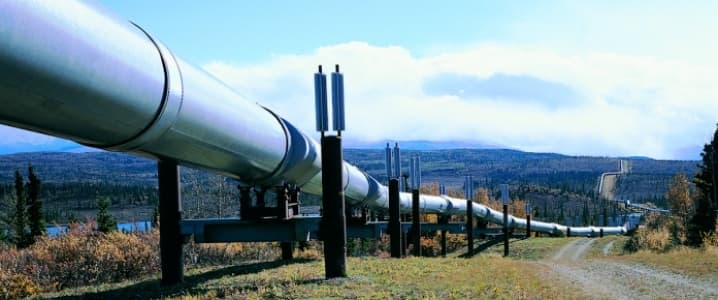The U.S. has seen shale production rebound strongly, continuing a long-running trend towards higher oil production. The shale boom has helped the U.S. slash its import dependence significantly over the past decade or so. But the lack of pipelines reaching the East and West Coasts has slowed the decline of imports. East Coast refiners in particular are still very much reliant on crude imports from abroad.

(Click to enlarge)
The surge in shale production from the Bakken, for example, came at a time when there was a dearth of pipeline capacity. That led to a flood of oil on the nation’s railways, a more expensive and more dangerous form of transport. Crude-by-rail shipments from the Midwest (which encompasses North Dakota’s Bakken) spiked to more than 800,000 barrels per day at its height in 2014.
But a buildout of pipelines from the Bakken and other parts of the country, largely aimed at the U.S. Gulf Coast, has significantly curtailed crude-by-rail shipments. The entire U.S. only saw 285,000 bpd move via rail in March 2017, most of which came from the Bakken. Canada chipped in another 183,000 bpd by rail.
The Dakota Access Pipeline probably puts the nail in the coffin for rail shipments. The 470,000-bpd pipeline opens up a major conduit for Bakken crude to reach the Gulf Coast.
Related: The World Is Millions Of Barrels Away From Peak Oil
In fact, Reuters reports that some major pipeline companies are having trouble filling up their lines, forcing them to offer discounts to producers for spot capacity. While the majority of oil shipped by pipeline is offered under long-term contracts, there is typically still some leftover capacity that is sold to producers at a higher price. But because pipeline operators are struggling with empty space, they are offering discounts in hopes of filling up their lines.
The result is much more oil and gas heading to the Gulf Coast, allowing the U.S. to both cut down on imports and also step up both crude and gas exports.
But that doesn’t do much for the East Coast, which still struggles to get access to Midwestern crude. Pipelines to the Gulf Coast are looking for buyers, but a pipeline bottleneck to the East Coast means that imports from abroad remain steady.
Building new pipelines is extraordinarily difficult in the highly populated Eastern Seaboard. Opposition from local communities makes it nearly impossible to build a new greenfield project.
But there is one existing pipeline in Pennsylvania that has become hotly contested and encapsulates the rise of both producers and refiners in the Midwest. The Laurel pipeline runs from East to West, allowing East Coast refiners to sell product to the Pittsburgh area. But its operator, Buckeye Partners, wants to reverse the flow of a section of the pipeline, allowing refined products from the Midwest to take over the market in much of Pennsylvania, which would cost East Coast refiners $10 million annually. Buckeye Partners is betting that the Bakken is the future, allowing the company to reliably keep its pipeline full. The Midwest also is more competitive because it has access to cheaper oil from the Bakken and Canada.
But if the full pipeline is reversed – all the way to Philadelphia – that could put some refiners along the East Coast out of business. Related: Goldman Sachs: Oil Crash Unlikely To Continue
The issue might seem like a local one, but it could upend trade flows. While it could be an existential threat to East Coast refiners, proponents of the move argue that it would eliminate a large volume of imports. It would allow the Midwest to service the East Coast in a much bigger way. Crude oil and refined products from the Midwest are much cheaper than importing from Europe or West Africa. If the Laurel pipeline is constructed, it would open up a new route to the East Coast, allowing the U.S. to slash its import dependence.
Similarly, Sunoco is proposing the construction of the Mariner-2 pipeline, a project that would carry natural gas liquids from Ohio to the East Coast in Philadelphia. The story is similar – it would allow natural gas liquids from the Bakken to reach the East Coast, putting East Coast refiners in a bind but displacing imported fuels from abroad.
The shale story is still unfolding. The EIA sees U.S. oil production surging to over 10 million barrels per day by next year. But in order for that higher production to edge out imports, it would need to reach the East Coast.
By Nick Cunningham of Oilprice.com
More Top Reads From Oilprice.com:
- Can ‘Fire Ice’ Replace Shale?
- Is The U.S. Close To Achieving ‘Energy Dominance’?
- U.S. Refinery Products Are Taking The World By Storm



















The future of shale oil is simply to ship it elsewhere where there is refining capacity for the light grades shale produces. Check out what many shale producers are saying in their results lately, they talk about how they are exporting their production more and more. Shale oil simply isn't wanted here.